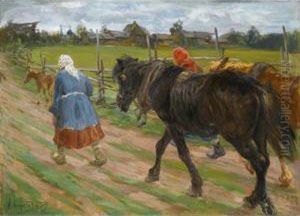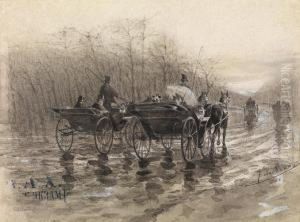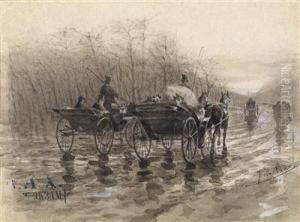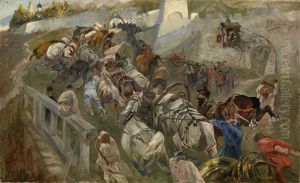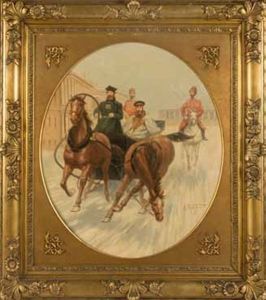Nikolai Vasilevich Pirogov Paintings
Nikolai Vasilevich Pirogov was a prominent Russian scientist, medical doctor, educator, public figure, and one of the most significant figures in the development of surgery and anatomy. Born on November 13, 1810, in Moscow, Russia, into the family of a civil servant, Pirogov went on to become one of the most notable and respected surgeons of the 19th century.
Pirogov's medical education began at the Moscow University at the age of 14, and he completed his studies with distinction. In 1828, he continued his education at the Imperial Medico-Surgical Academy in St. Petersburg, where he displayed a remarkable aptitude for medical science. After graduating in 1832, he further pursued his studies abroad in Germany and other parts of Europe, where he was exposed to the latest medical practices and theories of the time.
Upon returning to Russia, Pirogov took up a professorship at the Imperial Medico-Surgical Academy. His work in anatomy and surgery led to significant advancements in the field, including the development of new surgical techniques and the introduction of ether anesthesia in Russia. Pirogov is perhaps best known for his pioneering work in the use of plaster casts for the treatment of fractures and the development of field surgery, which he implemented during his service in the Crimean War (1853-1856). His experiences in the war were transformative, and they led him to publish a work titled 'Military-Field Surgery', which became a fundamental manual in the field.
Aside from his medical achievements, Pirogov was deeply involved in educational reform in Russia. He believed in the importance of practical experience and was an advocate for the education of women, supporting the establishment of courses for female medical students.
Nikolai Pirogov's contributions to medicine and society extended beyond his surgical innovations. He was also an early proponent of using anatomical studies (including the use of frozen sections) to improve surgical techniques, and his work in this area laid the groundwork for modern anatomical education. He passed away on December 23, 1881, in the town of Vinnytsia, Ukraine (then part of the Russian Empire), leaving behind a legacy that continues to influence medical practices and education. Pirogov's name is commemorated in various institutions, including the Pirogov Russian National Research Medical University, and in the Pirogov Society, which remains an important association for Russian surgeons.
